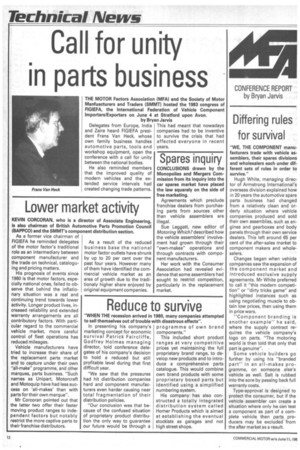Differing rules for survival
Page 14

If you've noticed an error in this article please click here to report it so we can fix it.
"WE, THE COMPONENT manufacturers trade with vehicle assemblers, their spares divisions and wholesalers each under different sets of rules in order to survive."
Hugh White, managing director of Armstrong International's overseas division explained how in 20 years the automotive spare parts business had changed from a relatively clean and orderly situation where vehicle companies produced and sold their own assemblies, such as engines and gearboxes and body panels through their own service dealers. This left around 65 per cent of the after-sales market to component makers and wholesalers.
Changes began when vehicle companies saw the expansion of the component market and introduced exclusive supply agreements. Mr White preferred to call it "this modern competition" or "dirty tricks game" and highlighted instances such as using negotiating muscle to obtain low prices, then using them in price wars.
"Component branding is another example" he said, where the supply contract requires the vehicle company's logo on parts. "The motoring world is then told that only that part is genuine".
Some vehicle builders go further by using his "branded part" in an all-makes programme, on someone else's vehicle as well. Salt is rubbed into the sore by passing back full warranty costs.
Type-approval is designed to protect the consumer, but if the vehicle assembler can create a situation where only he can test a component as part of a complete vehicle then parts producers may be excluded from the after market as a result.
































































































